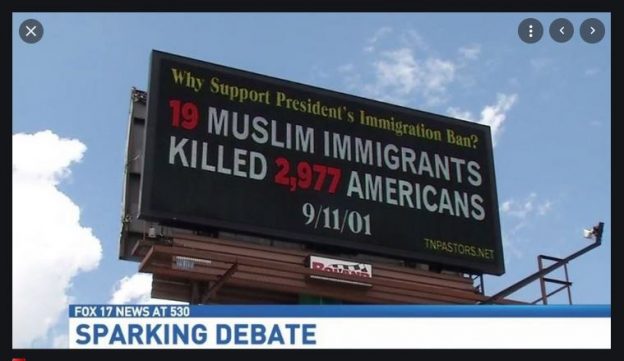CNN’s Jake Tapper wanted to know if there was anything that could have prevented the murderous rampage, in Manhattan, by a Muslim immigrant, who had been recruited to live in America for no good reason. Once upon a time that was known as a rhetorical question. To ask the question would have been to answer it.
Broadcaster Mark Levin was no less obscurantist. You can’t bring certain individuals like the culprit, Uzbek Sayfullo Saipov, into the US, because … of their governments, Levin raged on Fox News. There’s no way to vet individuals from chaotic countries with ineffective governments.
Sure, you can vet immigrants. Find out which faith they practice.
Mark should have said, “You can’t bring Muslims into the US because of their faith. It predisposes them to violence,” which is pretty much what President Donald J. Trump stated during his 2016 campaign.
The president’s first limited, immigration moratorium has expired. Let us hope that, following the murder-by-Muslim-immigrant of eight pedestrians along Manhattan’s West Side Highway—Saipov ran them over in a rented pickup truck—the president follows through, in the teeth of treasonous opposition, and expands the original “travel ban” beyond the six Muslim-majority nations to which it applied.
For a Muslim ban is neither illogical, immoral, or un-libertarian.
Violent Jihad is not an ideology, as our Moderate Muslim friends keep calling it. Jihad is a pillar of a faith. That faith is Islam.
Christianity has just commemorated 500 years since its Reformation. Islam has yet to undergo a reformation; it’s still radical. Yes, there are many moderate Muslims. Perhaps a majority of them. But their existence and their moderate beliefs do not belie Islam’s radicalness.
The fact that there are moderate Muslims doesn’t mean there is a moderate Islam—or that these moderates won’t sire sons who’ll embrace the unreformed Islam. The data show that young, second-generation Muslims are well-represented among terrorists acting out almost weekly across the West.
Vetting will do nothing to stop second-generation Muslim Americans. These are American citizens or legal residents, as Saipov is, who’re more prone to act out on their faith than their parents.
Religion is The Risk Factor, not chaotic countries-of-origin. It’s impossible to vet migrants not because of ISIS infiltration, or countries in disarray, but because Islam is a risk factor. Their Muslim faith puts Muslims in a security risk group.
Being Muslim is a predisposing characteristic, a risk factor, if you will, for eruptions associated with this religion. By “a risk factor,” I mean that Islam predisposes its believers to aggression against The Other. For in Islam we have a religion that doubles up as a political system that counsels conquest, not co-existence. (“Islam’s borders are bloody,” cautioned Samuel Huntington.)
A preponderance of Muslims will remain dormant. But, as we see almost daily in the West or in the Muslim world (where Muslim factions vie for religious dominance), a Muslim individual could be “triggered” at any time to act on his radical religion.
So what if Moderate Muslims assure us Saipov was acting out-of-faith. That’s irrelevant to the irreversible outcomes.
It’s a distraction to claim, as The Moderates do, that the Jihadi is misinterpreting Islam, and that we must all do battle for the real Islam, a thing as elusive as Bigfoot or the unicorn. Fact: A Muslim’s actions, be they in accordance with the real Islam or not—sanctioned theologically or not—could be deadly.
Consider:
Proposition 1: The faith of all Muslims is Islam.
Proposition 2: Islam teaches and sanctions some disturbing things like Jihad against the infidel.
Proposition 3: Some Muslims, practitioners of Islam, will be prone to act on teachings that are indisputably part of Islam.
While most Muslims are not terrorists, an unusually large number is willing to dabble in the lifestyle.
Policy is meant as a declaration of the common good. On average, a bunch of people that commits more faith-based murders than another group (say non-Muslim Chinese) is unsuitable as a source of immigration to the US.
In other words, all Muslims can thrive in America. But not all Americans will thrive in the presence of Muslims. Again, this is because the faith of Muslims is Islam. And Islam—the real or the imposter variety; it matters not—predisposes to violence. Some Americans will be hurt or die as a result of importing members of this militant faith.
More important, public policy is about aggregates. On the whole, it’s supposed to benefit, and certainly not endanger, the collective. Because of its immense potential to harm, libertarians believe the entity that executes public policy, the government, should do very little. And the duty of an American government is to safeguard its own citizens, not to welcome the world’s.
Rejecting Muslim immigrants won’t kill Americans. Accepting them might.
Not only is American public policy not meant to benefit the world; it’s not a means to a diplomatic end—appeasing the Muslim partners of our crooked lawmakers. Law must minimize aggregate harm. (Sensible, reality bound libertarians will embrace Popperian minimal harm, not Bentham’s maximum happiness, for the most people.)
U.S. public policy must, very plainly, keep Americans safe AND ALIVE without aggressing against foreign nations. It has no obligation whatsoever to make Muslims whole or happy—especially if this could end up costing American lives, stateside.
Since humanity has no inherent, natural right to venture wherever, whenever—stopping Muslim mass migration into the U.S. not only makes good sense, but doesn’t violate humanity’s natural rights.
CATEGORIES: Immigration, Islam, Jihad, Libertarianism, Natural rights, Political Theory, Terrorism

 print
print